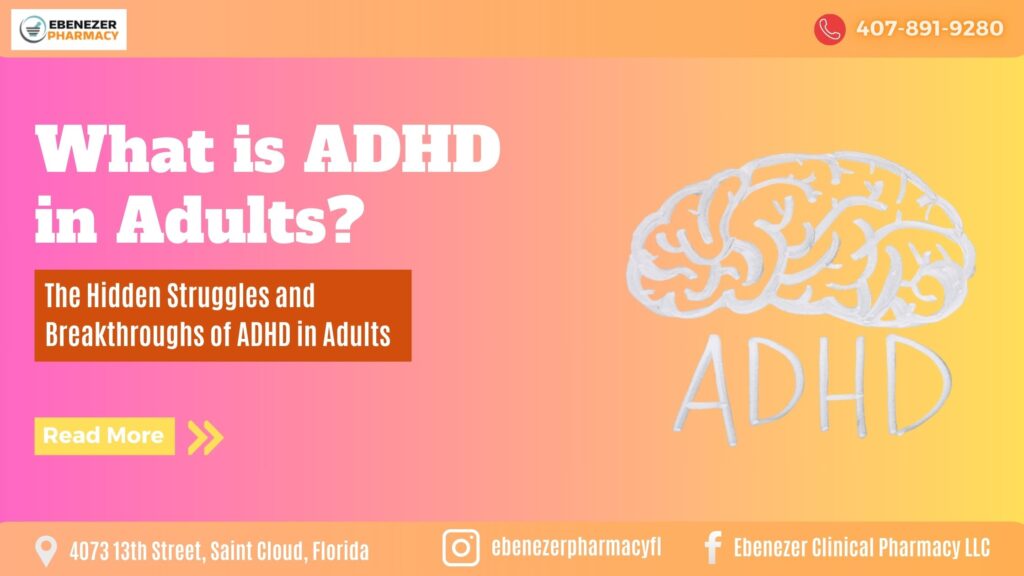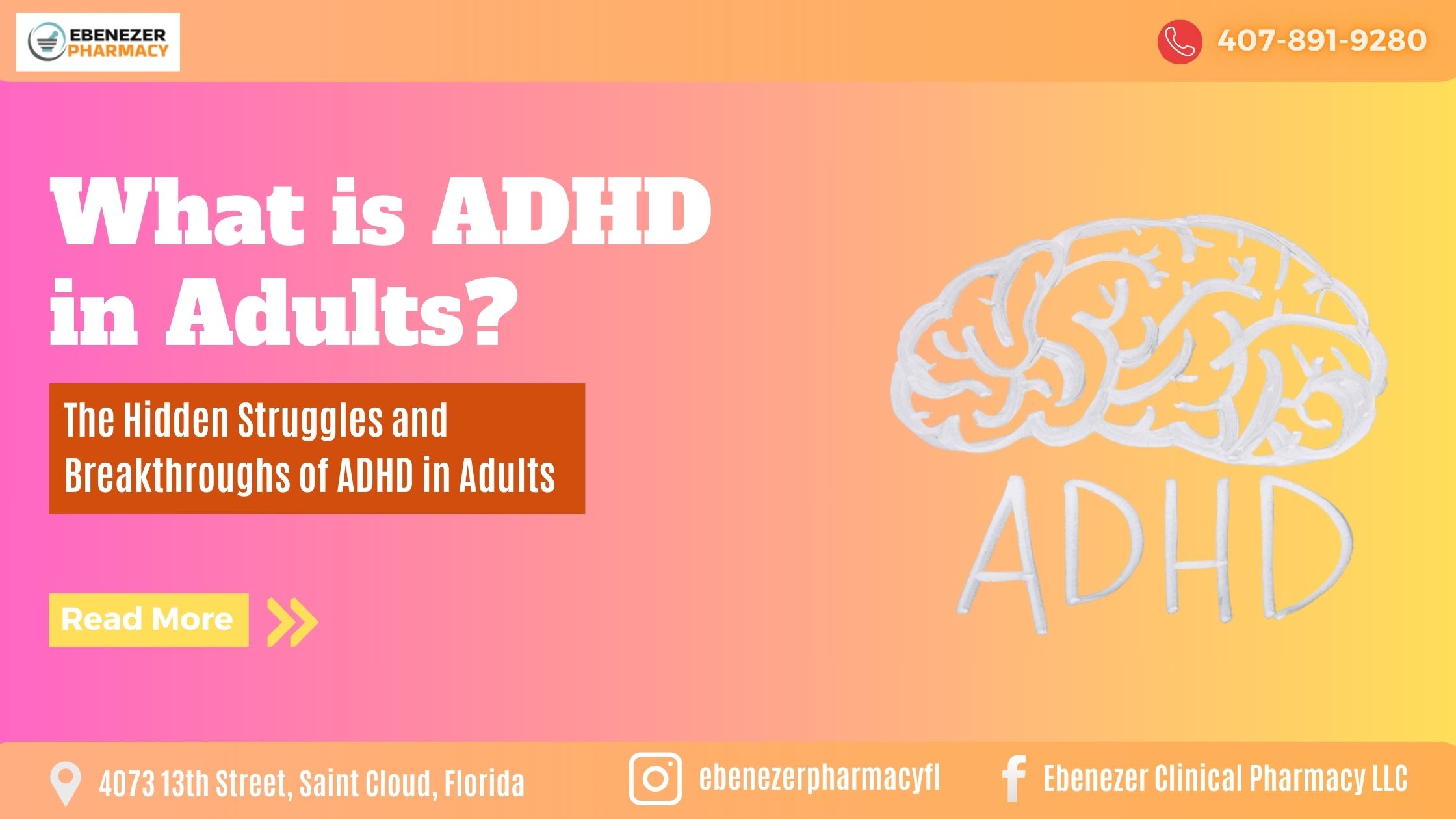
Attention Deficit Hyperactivity Disorder (ADHD) is often associated with children, but it also affects adults. Many individuals remain undiagnosed until adulthood, struggling with symptoms that impact their daily lives. ADHD in adults manifests differently than in children, primarily affecting focus, impulse control, and executive functioning. While some outgrow childhood symptoms, others continue to experience significant challenges.
ADHD in adults can lead to difficulties in work, relationships, and mental well-being. It is crucial to understand its symptoms, seek an accurate diagnosis, and explore treatment options to improve quality of life.
ADHD in Adult Symptoms
Adults with ADHD may display a range of symptoms, often differing from childhood ADHD presentations. Common symptoms include:
- Inattention: Difficulty maintaining focus, easily distracted, forgetfulness
- Impulsivity: Interrupting conversations, making hasty decisions, risk-taking behavior
- Hyperactivity (Less Common in Adults): Restlessness, excessive talking, inability to relax
- Disorganization: Struggling with time management, meeting deadlines, or keeping track of tasks
- Emotional Dysregulation: Mood swings, frustration, and sensitivity to criticism
- Difficulty in Relationships: Struggles with communication, maintaining friendships, or following social norms
Symptoms can vary in severity and may be influenced by lifestyle, environment, or co-existing mental health conditions like anxiety or depression.
What Are ADHD Symptoms in Adult Women?
ADHD symptoms in adult women are often overlooked or misdiagnosed due to societal expectations and differences in symptom expression. Women with ADHD are more likely to experience:
- Internalized Hyperactivity: Feeling restless but not displaying overt hyperactivity
- Emotional Sensitivity: Increased anxiety, mood fluctuations, and rejection sensitivity
- Masking Behavior: Hiding symptoms by overcompensating with organization or social strategies
- Difficulty Balancing Responsibilities: Struggles with managing household tasks, work, and personal life
- Chronic Fatigue: Exhaustion due to mental overload and constant self-regulation efforts
Because symptoms in women are less obvious than in men, ADHD in adult women diagnosis is frequently delayed or mistaken for anxiety or depression.
ADHD in Adult Women Diagnosis
Diagnosing ADHD in adult women requires a thorough evaluation by a healthcare professional. The process typically includes:
- Detailed Medical and Psychiatric History: Understanding childhood behavior, academic performance, and current challenges
- Self-Reported Symptoms: Completing standardized questionnaires or checklists specific to ADHD
- Clinical Interviews: Discussions with mental health professionals to assess symptom patterns
- Observation of Daily Functioning: Evaluating work performance, relationships, and coping mechanisms
Women with ADHD may have developed strong coping mechanisms that make symptoms less noticeable, further complicating diagnosis. Seeking an ADHD specialist can improve diagnostic accuracy.
ADHD in Adult Diagnosis
The diagnostic process for ADHD in adults involves multiple steps to rule out other conditions and confirm symptom persistence.
How to Get Diagnosed with ADHD in Adults
- Consult a Healthcare Professional – Schedule an appointment with a primary care doctor, psychiatrist, or psychologist.
- Complete an ADHD Assessment – Engage in structured interviews and standardized rating scales.
- Provide Medical and Family History – ADHD has a genetic component; discussing family history can help with diagnosis.
- Undergo Cognitive and Behavioral Testing – Some specialists use cognitive tests to measure attention and executive function.
- Receive a Comprehensive Evaluation – A professional will assess whether symptoms meet the criteria for ADHD in the DSM-5.
Test for ADHD in Adults
While there is no single test for ADHD in adults, professionals use a combination of assessments, including:
- Adult ADHD Self-Report Scale (ASRS) – A screening tool to evaluate ADHD symptoms
- Conners’ Adult ADHD Rating Scales (CAARS) – Assesses symptom severity
- Neuropsychological Testing – Measures cognitive function, memory, and executive skills
- Clinical Interviews – In-depth discussion with a mental health expert to confirm diagnosis
Why ADHD in Adults is Often Undiagnosed
Many adults remain undiagnosed due to:
- Lack of awareness about adult ADHD symptoms
- Misinterpretation of symptoms as anxiety, depression, or stress
- High-functioning individuals masking symptoms
- Limited access to ADHD specialists or evaluation services
Treatment Options for ADHD in Adults
Once diagnosed, ADHD in adults can be managed through:
Medication
- Stimulants (e.g., Adderall, Ritalin) – Improve focus and impulse control
- Non-Stimulants (e.g., Strattera, Intuniv) – Alternative for those who don’t tolerate stimulants
Therapy and Coaching
- Cognitive Behavioral Therapy (CBT) – Helps manage ADHD-related challenges
- Executive Function Coaching – Provides strategies for time management and organization
- Mindfulness and Relaxation Techniques – Reduces impulsivity and improves emotional regulation
Lifestyle Adjustments
- Structured Routines – Helps maintain organization and reduce forgetfulness
- Regular Exercise – Boosts dopamine levels, improving focus and energy
- Healthy Diet – Nutrient-rich meals support brain function and emotional balance
FAQs
How common is ADHD in adults?
ADHD affects approximately 4-5% of adults, though many remain undiagnosed.
Can ADHD develop in adulthood?
No, ADHD is present from childhood but may not be recognized until adulthood.
What is the difference between ADHD in adults and children?
Adults often exhibit more inattention and executive dysfunction, while children show more hyperactivity.
Do women experience ADHD differently than men?
Yes, women are more likely to have inattentive ADHD and may struggle with emotional regulation.
Can ADHD in adults be treated without medication?
Yes, therapy, lifestyle changes, and coaching can help manage symptoms effectively.
Where can I get tested for ADHD as an adult?
You can consult a psychiatrist, psychologist, or ADHD specialist for an evaluation.
Conclusion
ADHD in adults is a lifelong condition that impacts daily life, relationships, and work performance. Recognizing symptoms, seeking diagnosis, and exploring treatment options can significantly improve overall well-being. If you suspect ADHD, consult a healthcare professional for proper assessment and support.
